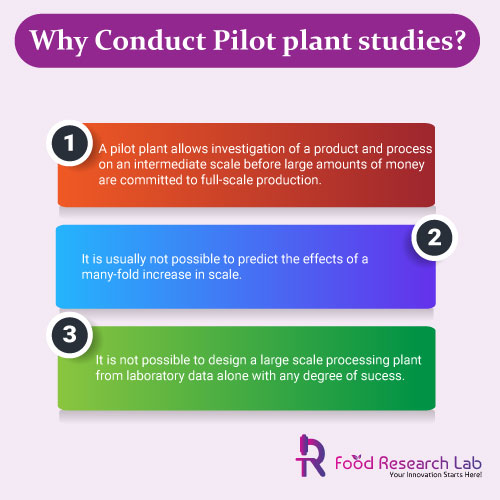
Importance of R&D Pilot Plant for Food Businesses
What Is Food Pilot Plant?
The food pilot plant is a scaled-down facility designed to mimic the production of food and beverages. It enables manufacturing companies to experiment with and develop test products in industrial settings (up to 1,000-litre batches).
The factory serves as a link between product development and full-scale commercial production. It incorporates a variety of portable production equipment and is intended to meet a variety of applications.
When scaling a novel process, a lot of money is on the line. Bringing a lab-scale process directly to a commercial facility puts you and your investors at risk, even if you’ve generated reaction data and theoretical models defining every aspect of the process. Calibrating for modifications to raw materials and process equipment is a vital step in getting your product to market safely and effectively. Food contact manufacturing is another aspect that helps companies scale up a business.

The Top 4 Benefits of a Pilot Plant
- A Pilot Plant Helps Gather Process Data.
Instrumentation and sampling locations abound in Pilot Plants, allowing you to obtain precise process data throughout your process. For a future production-scale process system, you may utilize this data to refine and precisely forecast the following information:
- Effects of recycling streams
- Purity of the product
- Waste processing
- Estimates of yield that have been refined
2. One Can Test Commercial-Grade Materials And Equipment In A Pilot Plant.
When pricing raw materials for commercial usage, you’re likely to experience price shock. When you’re no longer in the lab, you’ll notice that high-quality raw materials are more expensive when purchased in bulk. You’ll almost certainly need to modify the quality of your supplies, which can significantly impact your procedure. Furthermore, commercial-grade equipment performs differently than lab equipment and, in most circumstances, requires distinct materials of construction. R&D pilot plant manufacturers provide solid data to support the scale-up of any business.
The success of any process scale-up project depends on thoroughly testing how these modifications will affect your approach. You can prevent costly mistakes on a larger scale by trying these modifications on a smaller scale first while still getting a good deal.
3. Food Pilot Plant Facilities Generate A Product That Can Be Utilized
If you hurry to launch a product to beat your competitors or don’t want to miss any food trends, the pilot plant helps you do the tasks fast. You can utilize the product from your pilot plant to evaluate process feasibility and return on investment for investors, distribute samples to customers to create a customer base, or begin selling your product outright.
How you use the products from the pilot plant is entirely up to you. The idea is that having a pilot plant allows you a variety of choices for swiftly and safely bringing your product to market.
4. For small-quantity products, a pilot plant is a feasible long-term alternative.
While many pilot plants are retired once the commercial process is completed, other firms keep their pilot plants to develop speciality formulations long after the commercial operation is completed. As your firm grows, you may reassign your pilot plant to test formula modifications on existing formulas or new product lines.
What Is the Cost of a Pilot Plant?
You’re probably wondering how much a pilot plant will cost now that you know how it can assist you to avoid the commercial and technical pitfalls of growing your business. The answer is determined by a mix of capital cost elements and the competence of the pilot plant manufacturer you choose to oversee your project. Food pilot plant consultants allow you to estimate project costs.
Food Research Lab offers food processing pilot plant services to execute your research works, new product developments and even contract to manufacture.
The Food Research Lab Contract R&D pilot plant contains the following areas:
- Five temperature-controlled rooms for seafood
- meat, and horticulture specialized industrial-sized cold and freezer rooms
- high hygiene cool room for fresh product handling
- warm space for the thermal operation of fermentation
- dry goods storage
- food-grade certification controlled loading dock areas.
With new technological advances happening every week and the consumer demand always on the change, food and beverage companies need to tie up with contract manufacturing companies to test, manufacture and scale their products.






